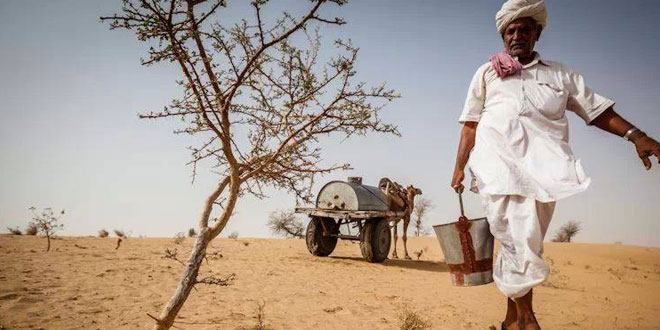Ranaram Bishnoi from Ekalkhori village near Jodhpur has planted more than 50,000 variety of plants, converting a sand dune into a green garden.
Five decades ago, when a young boy of 25 years from Ekalkhori village near Jodhpur travelled hundreds of kilometres to attend a community festival in Bikaner, little did he know that it would inspire him to one day, defy the impossible. In that festival young Ranaram Bishnoi attended an impactful session on environment and how planting trees now would be profitable in the future. Putting his newly acquired knowledge into practice, Ranaram made it his life’s goal to plant trees in the desert and on his way home, he bought a couple of plants. Cut to 2018, now at 78, Ranaram has planted over 50,000 trees and transformed the sand dune into a green garden.
The plants are god-like for me and by serving them I feel accomplished and relieved, says a beaming Ranaram, who has earned the sobriquet of ‘Tree Man’.
He believes that non-human species have equal or rather more rights to live on earth than humans.The plants and the animals were on the planet much before we landed here. They have more rights on the planet than us and if we cannot give that to them at least we can ensure we don’t destroy them in our greed, he says.
For the last 50 odd years, Ranaram climbs a high sand dune every alternate morning and waters the trees he has planted with a large earthen pitcher. He walks walks for 3 km, from his house to the dune. Climbs and goes down to the other side to get the water from his friend’s tubewell and mount it back, defying his age. Across ten acres of land, so far, he has planted more than 50,000 variety of trees including Neem, Rohida, Fig, Khejri, Kankeri, Babool and Bougainvillaea.
With the plantation of thousands of trees, he has single-handedly stopped the march of the desert. Had trees been not planted, the desert would have muzzled the farmlands adjoining it and beyond.
He has developed a small crater on the dune to collect water using a big polythene sheet and keep it covered to avoid the water from being consumed by the cattle and getting evaporated. Ranaram has also started a nursery in his house to prepare seeds and saplings of the plants and spray the seeds every rainy season on the dune.
Ranaram’s son Vishek Bishnoi is his biggest supporter and aide in raising awareness among the villagers and planting trees. At the tender age of five, Ranaram carried Vishek on his shoulders and took him to his work-in-progress sand dune to plant his son’s first tree. Since then he has been helping his father and encouraging THE villagers to join the movement.
My father dedicated his entire life in plantingtree in our village. For him, planting trees is not a responsibility or work, it is part of his daily routine. Just like breathing is important for us, planting and nurturing trees is for him. Fromhim Ilearnt, that nature will take care of us only if we reciprocate in the same manner.
While many villagers have contributed in Ranaram’s mission by providing financial support, water and plant saplings, Ranaram believes that support from the women community is the most vital. To encourage women and girls of his village, he gives them an incentive.
Sometimes, I also take the women of my house along and sometimes I take the girls of the village to help watering the plants spread on the large chunk of the dune and pay them Rs. 2 per plant from my pocket, he says.
Ranaram belongs to the Bishnoi community, which has in the past, fought tooth and nail with authorities or groups who have propagated tree felling. They are also known for their love for nature worship and wildlife conservation. It was this community that pursued preservation of Blackbucks in Rajasthan. A Bishnoi, therefore, would never tolerate the killing of wild animals or the cutting down of a tree. Given this historic background of conservation and preservation, Ranaram’s passion for his trees seems like natural progression to defy odds and take care of planet earth.
Article Credit :- NDTV

